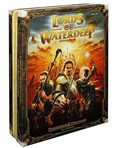“Board Game Collector” sounds like an extremely strange hobby to have in your free time. I would know; I’ve gotten a lot of confused expressions over the years when I’ve introduced myself and offered freely that I like to break out Monopoly without warning and waste six hours of everyone’s lives. To most, board games are…well, boring. What type of challenge does CandyLand offer a young adult? What sort of person gets excited to breaking out Snakes and Ladders when they could be playing on their Nintendo Switch? And it’s not like Risk is screaming “life of the party”.
This is about the time when I have to step in and explain— quite mind-blowing to some— that there are more board games than the ones you probably played as a kid. So here is a quick guide to the five main types of board games and a few suggestions of interesting things to play when your phone is busy charging.
First and foremost, before anything, you’re going to want to know what type of people you’re playing with (if you’re playing with anyone at all! —the cool thing about a lot of games is that they come with a modified version that allows you to play by yourself as well). There are generally three types of players: those that enjoy competition, those that enjoy cooperation, and those that enjoy both. Knowing these things can dramatically impact the playing experience: someone who doesn’t enjoy fighting against others is probably not going to enjoy a game that’s based solely on battling against the other players to win. Likewise, someone who enjoys the challenge of outsmarting their competition is most likely going to find a purely cooperative game just plain frustrating! By keeping in mind what sort of people you want to play a game with, you can identify games that won’t lead to everyone being in tears.
To begin, Roll and Move games are probably the most common,  as well as type that most are familiar with. As it says on the tin, these are the games where you roll dice (or spin a wheel) to move a character token that number of spaces. Monopoly, Trouble, and Trivia Pursuit probably come to mind, but more adventurous players might find it good to check out games such as Police Precinct, where players act as the police in a small city, trying to solve a mysterious murder while keeping control of the rising crime wave.
as well as type that most are familiar with. As it says on the tin, these are the games where you roll dice (or spin a wheel) to move a character token that number of spaces. Monopoly, Trouble, and Trivia Pursuit probably come to mind, but more adventurous players might find it good to check out games such as Police Precinct, where players act as the police in a small city, trying to solve a mysterious murder while keeping control of the rising crime wave.
 Worker Placement games involve small figurines (known as meeples) being placed on a board to trigger certain actions that advance the game. Usually, these can be used to accomplish a goal, but it’s also possible to use them to block other players. For those who always wanted to try Dungeons and Dragons, Lords of Waterdeep provides the excellent opportunity to visit the realm of adventurers and monsters by allowing you to send agents into the city to recruit adventures to complete quests that further your own private goals.
Worker Placement games involve small figurines (known as meeples) being placed on a board to trigger certain actions that advance the game. Usually, these can be used to accomplish a goal, but it’s also possible to use them to block other players. For those who always wanted to try Dungeons and Dragons, Lords of Waterdeep provides the excellent opportunity to visit the realm of adventurers and monsters by allowing you to send agents into the city to recruit adventures to complete quests that further your own private goals.
Deck Building games are mostly card games with specialized cards that allow players to do actions. As the game progresses, the players are given opportunities to change the hands of cards that they draw and build a strategy based on it—and yes, Magic the Gathering and Pokemon generally fall into this category but buying thousands of dollars worth of cards is not always necessary. Star Realms brings the fun of outer space to the nearest table by encouraging players to collect cards with powerful spaceships in order to out-maneuver their opponents’ defenses, all without needing to pay for more than the base game.
With all the buzz that was the Among Us video game during the quarantine, it’s no surprise that Secret Identity games are also pretty popular. They’re best with a group of people, especially parties if you want to get to know each other really well, really fast. In these games everyone will have a secret identity—however one or two will have a role that actively goes against the rest of the group. Key components usually involve lying and deception and logic so beware! These are not the games to pursue if you enjoy cooperation! One Night Ultimate Werewolf drops players into medieval times, pitting various townspeople against werewolves for the ultimate thrill of the kill.
games are also pretty popular. They’re best with a group of people, especially parties if you want to get to know each other really well, really fast. In these games everyone will have a secret identity—however one or two will have a role that actively goes against the rest of the group. Key components usually involve lying and deception and logic so beware! These are not the games to pursue if you enjoy cooperation! One Night Ultimate Werewolf drops players into medieval times, pitting various townspeople against werewolves for the ultimate thrill of the kill.
Puzzle games rely on good pattern recognition and the willingness to think outside the box, as well as plan ahead more than the others. These are the ones that are easiest to get frustrated with, but also the most rewarding to win! For those interested in escape rooms without the pressure of being locked in, Exit: The Game is a series of scenario cards that present the same clues and require the same problem-solving skills without even the timer (if you should choose to play without it)! Games can also be tailored to the skill level of the players through the easy-to-use difficulty levels advertised.
Of course, these are just a few of types of games in an ever-evolving branch of entertainment. As technology has advanced, ways to play has too: now more than ever, board games are finding new ways to involve apps for easier point counting or to unlock hidden lore about the game. New themes and topics are constantly being explored, and even then, even the wildest ideas are likely to have a game on the market waiting to be discovered. It’s certainly worth a stroll down to the game aisle at the local Walmart to see, isn’t it?



